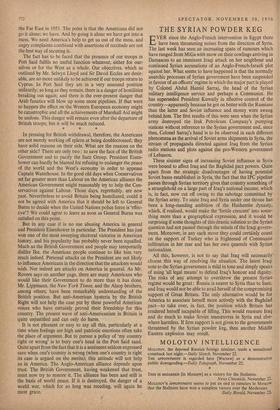THE SYRIAN POWDER KEG
EVER since the Anglo-French intervention in Egypt there have been threatening noises from the direction of Syria. The last week has seen an increasing spate of rumours which have ranged from MiGs with snow on their cowlings arriving in Damascus to an imminent Iraqi attack on her neighbour and continued Syrian accusations of an Anglo-French-Israeli plot against her. What seems to have happened is that the normally anarchic processes of Syrian government have been suspended in favour of an officers' regime in which the major part is played by Colonel Abdul Hamid Sarraj, the head of the Syrian military intelligence service and perhaps a Communist. He has superseded President Kuwatly in effective control of the country—apparently because he got on better with the Russians than the latter and Soviet influence and money were swung behind him. The first results of this were seen when the Syrian army destroyed the Irak Petroleum Company's pumping stations without reference to the Syrian government and, since then, Colonel Sarraj's hand is to be observed in such different phenomena as the arrival of Soviet arms shipments in Syria, the stream of propaganda directed against Iraq from the Syrian radio stations and plots against the pro-Western government of Lebanon.
These sinister signs of increasing Soviet influence in Syria were bound to affect Iraq and the Baghdad pact powers. Quite apart from the strategic disadvantages of having potential Soviet bases established in Syria, the fact that the Il'C pipeline passes through Syrian territory gives that country something of a stranglehold on a large part of Iraq's national income, which is, in fact, now cut off owing to the sabotage committed by the Syrian army. To unite Iraq and Syria under one throne has been a long-standing ambition of the Hashemite dynasty, which, if realised, would make the 'fertile crescent' into some- thing more than a geographical expression, and it would be surprising if some thoughts of this drastic solution to the Syrian question had not passed through the minds of the Iraqi govern- ment. Moreover, in any such move they could certainly count on the support of Turkey who is frightened of Communist infiltration in her rear and has her own quarrels with Syrian nationalism.
All this, however, is not to say that Iraq will necessarily choose this way of resolving the situation. The latest Iraqi note to the Syrian government is mild in tone and simply speaks of using 'all legal means' to defend Iraq's honour and dignity. The risks of any attempt to overthrow the present Syrian regime would be great: Russia is nearer to Syria than to Suez, and Iraq would not be able to avail herself of the compromising support of Great Britain. The only alternative would be for America to associate herself more actively with the Baghdad pact—to take over, in fact, the position which Britain has rendered herself incapable of filling. This would reassure Iraq and do much to make Soviet manoeuvres in Syria and else- where harmless. If firm support is not given to the governments threatened by the Syrian powder keg, then another Middle Eastern explosion may result.


















































 Previous page
Previous page